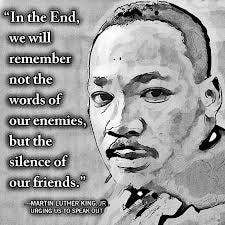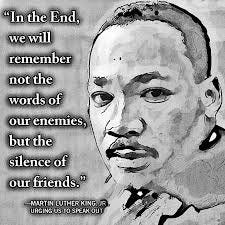Much is made of the notion that “silence is complicity.” The saying suggests that, once an injustice appears in the world, if you DO NOT use your voice to speak against it, your silence makes you complicit with the injustice. Some even take this further and cut off any dialogue with those deemed complicit (by their silence). It is a mantra that carries much currency among justice movements everywhere.
The complicity accusation motivates multitudes to quickly run onto social media and decry acts of injustice. In so doing, social media can often bring acts of injustice into the immediate public consciousness. But sometimes this can lead to other things. The mad flocking to social media to declare one’s allegiance can produce virtue signaling. Many, often white affluent types, get vindication that they have now spoken on social media, and have contributed to the work of justice. Arguments ensue. Hate and vitriol follow. And in the process, any actual engagement with injustice on the ground gets lost. In fact, the people actually engaging the injustice on the ground can get stigmatized as social media activists rush to judgement. The “silence is complicity” mantra can have an unintended effect: to actually undermine the work of justice on the ground. Using your “voice’ well for the causes of justice takes on a whole new complexity.
MARTIN LUTHER KING ON COMPLICITY
I contend that Martin Luther King jr., if he were alive today, would not recognize the social media use of his idea “silence is complicity.” Perhaps the premier representative of the notion that “silence is complicity,” MLK famously preached that “In the end, we will remember not the words of our enemies, but the silence of our friends.” (Steeler Lecture Nov 1967 Dexter Ave Baptist Church Montgomery). In his ‘Letter from the Birmingham Jail,’ King said “we will have to repent in this generation not merely for the vitriolic words and actions of the bad people but for the appalling silence of the good people.” The “silence is complicity” argument runs throughout the entire oeuvre of Martin Luther King’s speeches and writings.
But has the “silence is complicity” argument been changed by the current day social media, virtue signaling, and celebrity justice? Has it actually morphed into something that undermines the work of justice?
Martin Luther King jr. lived in a world of unquestioned white hegemony. Early in his leadership of the civil rights movement, he trusted that white people, given some time, would see the injustices of racism against black people in America and do something about it. Speaking clearly in the midst of this singular hegemony, MLK believed the message would always be clear and call people to justice. But over time, MLK came to see that this was not necessarily true. Indeed, he came to see the ways ideology works to justify racism in the minds of white people. He even saw how ideology works to make white racists believe they are not racists at all. And so merely saying something was not enough. In fact it could backfire against the purposes of justice. (to follow MLK’s development in his thinking read James Cone’s Martin and Malcolm in America )
Through his tumultuous relationship with Malcolm X, MLK saw the way some words, including his own words, could play into the white hegemony of the American culture. Malcolm accused MLK of being a “religious Uncle Tom” and a “traitor, ”a “Rev. Dr. Chickenwing.” (p.99 Martin & Malcom). It was a complicated relationship to say the least. But over time, from within this dialogue with Malcolm,, MLK saw how much any movement for racial justice required a black people united as a community to be physically and socially present to the social injustices against them. Words alone, were not enough. Indeed if the words were separated from social presence, they could get ideologized and used to aid the ongoing regimes of racism. Saying something, without physical presence, could actually contribute to a further digging into racist justification by white persons. Words need social presence to have impact.
It is ironic that, in his Letter from Birmingham Jail, the same letter that he argued that “silence is complicity,” MLK also made the case for face to face, non-violent physical presence as the means to engage injustice. White clergy in Alabama were accusing him of being an “outside agitator” coming from Atlanta. King wrote “we had no alternative except that of preparing for direct action, whereby we would present our very bodies as a means of laying down our case before the conscience of the local and national community.” Words, MLK recognized, separated from physical embodied presence, accomplish little.
THERE MAY BE TIMES TO BE SILENT
And so there might be times for actual silence, listening and being present to injustice, for taking the time to embody words with presence. Perhaps nowhere else is this more true than on social media.
Social media, like no where else, extracts words from physical presence and the actual life lived that might give context to the words. And when words get extracted from context, they can become the tools for ideologizing. They not only do not change people or circumstances. They become used to further ensconce people in their own echo chambers, their own ways of thinking, their own habits of injustice.
And so there will be times when silence may not be complicity with social imjustice. Especially when that person, who would be spending his or her time on social media, instead goes among the hurting and broken and listens to what is going on. And then after days, months of listening, cooperates with God and people in bringing about change in cooperation with the power and presence of the Holy Spirit. And then, writing some words on social media might have weight.
Surely social media can aide in the work of presence-based justice work, but I cannot think of a more misguided notion than “I’m going to change the world through my social media account.” Much more likely? You’re the one going to be changed by your social media account. And it ain’t gonna be good. Instead recognize that social media can be used to start things on the ground, but if it becomes an end to itself, we shall get caught in echo chambers, and false sense of importance. Instead keep expectations for social media low. Don’t chase clicks. Use your social media to cultivate humbly some networks for the on the ground work of the Kingdom in your neighborhood. And let us not confuse listening for complicit silence. It is all preparation for an outbreak of the Spirit in our neighborhoods.
At Northern Seminary’s Doctorate in Contextual Theology we study how culture works, and how to lead church into engaging culture for the gospel. Racism, sexuality, gender, economics, neighborhood, and even social media, are spaces to become present to what God is doing for the gospel. Join us? More info here. Inquire about us out here.





When silence conceals violence ... it is violence. Material Girls released a conversation about the stickiness of this topic today. However Dave when you are scared to use a bathroom let me know how your piece would sound to you.